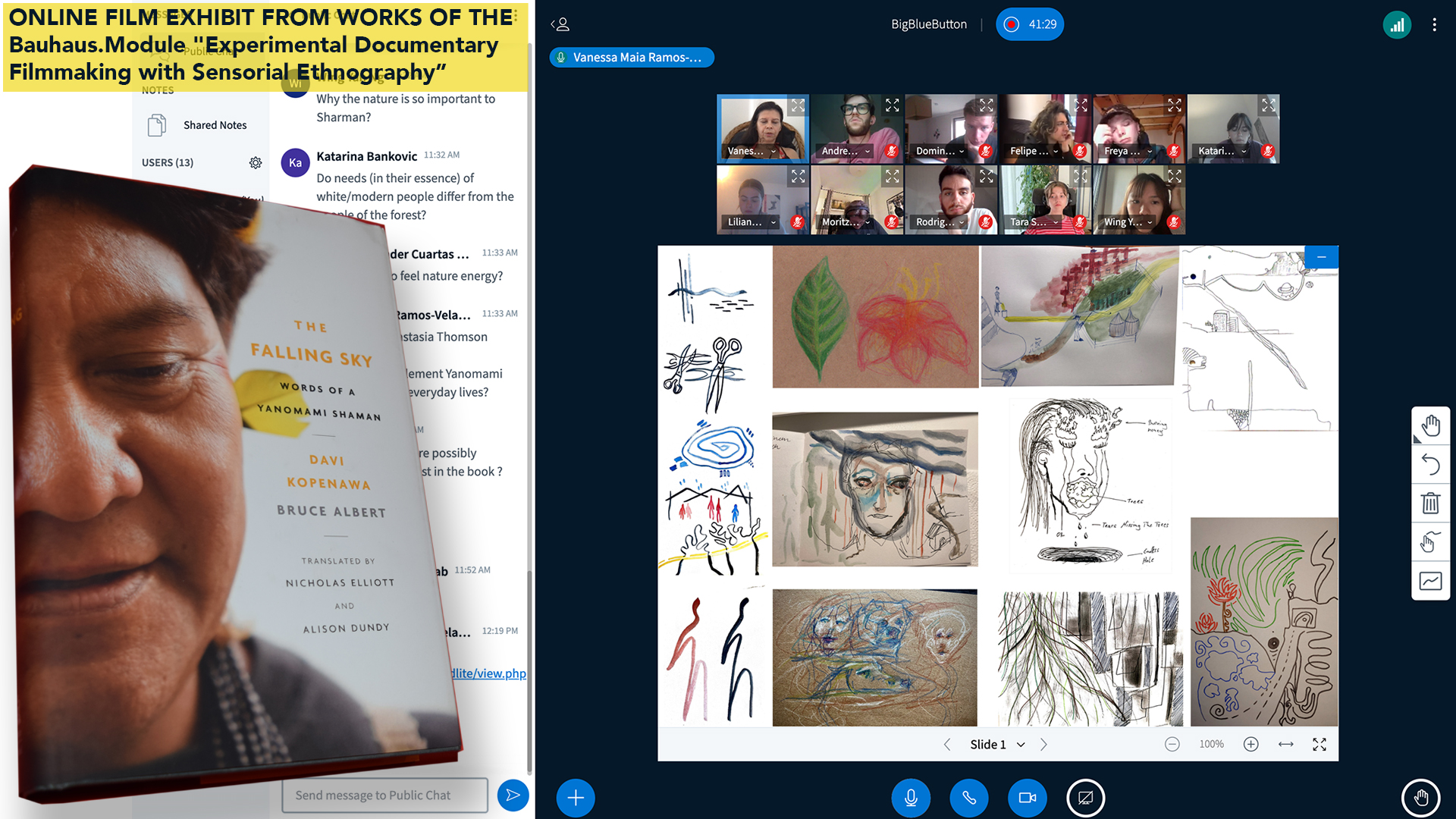When: April 20 to July 13, 2022
Where: Remote (Weimar, Berlin)
Institutions: Bauhaus University Weimar
Facilitator: Vanessa Ramos-Velasquez
Session: 13 meetings of 2 hours each = 26 hours
From April 20th until July 13th, 2022, our group of 9 to 12 people met weekly to share perspectives and learn about oneself, each other and Amazonian shamanic philosophy via the Pre-Texts protocol, with the book “The Falling Sky” by Davi Kopenawa Yanomami/Bruce Albert.

Until early June we met online for two hours each session. These sessions had the following activities:
– Leafs or Tangents from “The Falling Sky”.
Reflecting on these choices, the group chose to do more Tangents (8) than Leafs (5). The group really enjoyed sharing their Tangents and memories surrounding those contributions. Regarding the discussions, we had enough time in the sessions to offer up to 5 minutes for each participant to speak. They usually used 3 minutes to express themselves. When a topic was a hot button issue, the discussion generated a back and forth that the moderator had to intervene, but without stress. The experience was very positive for everyone. The engagement with the text was very genuine.
– Artistic activities while I read passages from “The Falling Sky” to the group.
The group experimented with drawing, collage, word highlights, soundscapes recordings, development of film ideas, diverse activities, black-out poetry, diverse activities on paper outdoor at the park. These activities helped the group to unleash their creative potential in a non-judgmental way. Their experimentation with artistic media and formats engaging with the words of a shaman being read to them has led to a non-hierarchical way to explore their own senses.
– Discussing the questions to the text.
I compiled all “questions to the text” that the students posted in the chat in the first session, and we discussed one of these questions in each session. We found this protocol very useful to dig deeper into first impressions of Kopanawa’s text, while students worked through their own philosophical positions in regard to nature and other topics, such as death, the destruction of the forest, the space of dreams, the practice of naming a person, identity, religion, how does one learn, what is Kopenawa’s expectation of white people after reading his text. It was so helpful for all of us to see these positions shifting and growing while learning from Kopenawa, the teacher from the forest.
– Sensory ethnography exploration exercises for filmmaking.
My proposition for the course was to work through Kopenawa’s text via Pre-Texts, while also developing a short film. I had proposed that we collect our embodied text impressions (the drawings, collages, etc) to incorporate them into the film, or at least to consider them as material to unleash creative processes for the filmmaking. In support of these activities and to open up the concept of nature, I offered a brief study of the discipline of Sensorial Ethnography. We also used Leafs and Tangents as a way to calibrate our senses beyond vision and sound, the classic milieu of the film medium. So, I offered 5 lab sessions in a workshop format to explore the concept of multisensorial, tactile cinema, and the skin of film, trying to bring all senses to the same level. Furthermore, we focused on the concept of perspective in nature. Whose perspective, when creating a narrative?
Reflecting on the entire group experience, what stood out was the friendships that were formed, each student supporting one another as they developed their film ideas, talking through challenges, all the while reflecting on the radically different philosophy and concept of nature from the world “out there” in the forest. Getting closer to the Amazonian world through these weekly activities and reflections broadened our perspectives. The artistic activities enhanced the shared values, such as solidarity, empathy, resilience, the web of relationships of affinity, and developing more awareness about the history and challenges of those living in the forest.